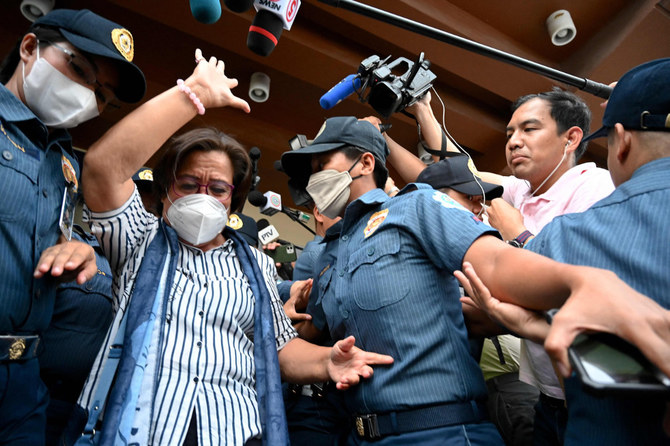MANILA: A former Philippine opposition senator and justice minister was acquitted of drug charges Friday after key witnesses recanted and said they had lied about her involvement in narcotics trafficking.
Leila de Lima, 63, remained jailed, however, as she has one outstanding charge against her.
De Lima has been detained since 2017 on drug charges she says were fabricated by former President Rodrigo Duterte and his officials in an attempt to muzzle her criticism of his deadly crackdown on illegal drugs. His campaign left thousands of mostly petty suspects dead and sparked an International Criminal Court investigation as a possible crime against humanity.
She is accused of taking money from inmates inside the country’s largest prison in exchange for allowing them to sell drugs while she was justice minister from 2010-2015 under then-President Benigno Aquino.
But the prosecution’s case has been falling apart as two of their witnesses died and one of the three charges against her was dismissed.
Multiple witnesses have recanted their testimonies, claiming they were coerced into making allegations against de Lima.
Duterte, who has insisted on de Lima’s guilt, left office last June at the end of his turbulent six-year term.
Trial court judge Abraham Alcantara said in his ruling that a former senior police official’s recantation led to his decision to acquit de Lima.
“Without his testimony, the crucial link to establish conspiracy is shrouded with reasonable doubt,” he wrote, “which warrants the acquittal.”
Prosecution witness Rafael Ragos, a former head of the Bureau of Corrections, retracted a claim to have delivered money from drug lords to de Lima and said he had been forced by government officials to make it.
De Lima, a former justice minister who won several human rights awards, has said the charges were trumped up and designed to silence her.
In 2021, a court dismissed one of three drugs cases filed against De Lima that stemmed from Duterte’s allegations, which led to multiple online hate campaigns against her.
De Lima said through her attorney that she was looking forward to her full acquittal on all charges. She has been held in pretrial detention since her arrest without any convictions.
“I have no doubt from the very beginning that I will be acquitted from all the cases the Duterte regime has fabricated against me based on the merits and strength of my innocence. That’s already 2 cases down and one more to go,” she said in a statement read out by lawyer, Boni F. Tacardon.
“I am of course happy that with this second acquittal in the three cases filed against me, my release from more that 6 years of persecution draws nearer. I am extremely grateful to those who stood by and prayed for me all this years,” she added.
A UN Working Group on Arbitrary Detention concluded in 2018 that de Lima’s detention was “arbitrary given the absence of a legal basis” and that her right to a fair trial had not been “respected.”
Since President Ferdinand Marcos Jr. took power in June 2022, there have been renewed calls from diplomats and rights defenders for de Lima to be released.
Before her arrest in 2017, de Lima had spent a decade investigating “death squad” killings allegedly orchestrated by Duterte during his time as Davao City mayor and then in the early days of his 2016-2022 presidency.
She conducted the probes while serving as the nation’s human rights commissioner, and then from 2010 to 2015 as justice secretary in the Benigno Aquino administration that preceded Duterte’s rule.
De Lima won a Senate seat in 2016, becoming one of the few opposition voices as the populist Duterte enjoyed a landslide win.
But Duterte then accused her of running a drug trafficking ring with criminals. The charges were an act of “vengeance” by Duterte to silence her and warn others not to oppose him, de Lima told AFP previously.
Campaigning from behind bars, de Lima made a failed bid for re-election to the Senate in last year’s elections.
The lawyer and mother of two has been held in a compound for high-profile detainees, rather than in one of the Philippines’ overcrowded jails.
It is not unusual for court cases to drag on for years in the creaky justice system, which is overburdened, underfunded and vulnerable to pressure from the powerful.













